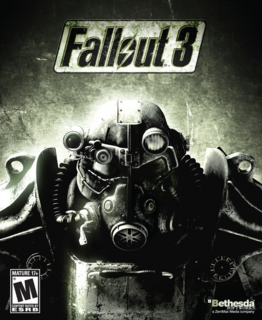A few rough edges, but still one hell of a game.
The Pip-Boy is a fairly weak point in the game. Bound by the previous Fallout games, Bethesda have had to jury-rig many of the features to make them fit, ending up an unnecessarily messy affair. Similar to Oblivion's menus, you have two levels of 'horizontal' menus as well as scrolling vertically, which means that what you want is usually two clicks and a scroll away... Far too much. Separating the inventory into individual sections is the greatest downfall here, but the system for repairing weapons and armour also deserves special mention for its awkwardness.
Another weak spot is combat. The game isn't a FPS, let's get that straight, but it does manage to produce some exceedingly visceral melee combats and spectacularly greusome firefights, which usually ends up with the explosion of enemy bodies. But at the same time, you're often left feeling that the game pits you at a serious disadvantage, due to balance issues. Sneaking is all but useless until you get it high enough, some creatures (especially the mirelurks) are disproportionately powerful AND well-defended, and drawing or changing weapons is a little clunky. The weapons, too, despite the mind-boggling choice, are all much of a muchness, offering no real feel of 'trading up' once you get your hands on the bigger and better weapons, which is thanks in part to the scaled gameplay system (again, another throwback to Fallout's older brother)
But with that said, this game is an absolute must-play, not least for the story. Disappointingly shorter than Oblivion (when the game feels as similar is it does, making the comparisons is unavoidable), the main story lacks any real punch, but this game is more about the collective breadth of all the stories, and how they come together. Bethesda have done a fine job splicing the Karma system into all areas of the game, so that you really are encouraged to pick a side and stay with it. And this choice affects so much throughout the game; there's much more comeback, good and bad, for the decisions you make than were present in Oblivion. Gone is the ability to be all things to all people that weakened Oblivion's RPG element. It seems that Bethesda really do learn from their mistakes.
Visually, Oblivion is stunningly bleak, in a way that will actually have you stop to look around plenty of times during the game. Oblivion's lush green hills were pretty to look at, but the hook with Fallout's graphics is that you're always left thinking 'this could be how things turn out.' The crumbling concrete skeletons of buildings and freeways, The Washington Monument, a symbol of old times that the Brotherhood of Steel pathetically clings to by ringing it with chunks of ripped-up blacktop, whilst The Mall has become a warren of trenches. Sometimes it can feel a little overdone, or you find yourself thinking 'you'd never see that in a post-apocalyptic wasteland,' but for the majority of the time you'll just think 'wow.'
So, in conclusion, the game is definitely not without its flaws, but ultimately, the game overcomes these with breadth, an artful weaving of multiple story threads, and the unsettling feeling that this could be an all-too possible future.

